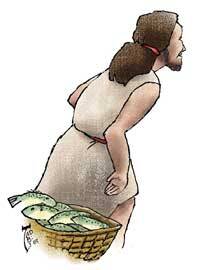No Ordinary Time
Give me chastity, but not yet.” This famous prayer of St. Augustine well captures the reluctance that most of us have to changing our ways. Yet we hear the exact opposite in today’s readings, when the Ninevites instantly repent at Jonah’s preaching and the fishermen immediately leave their nets to follow Jesus. There is an urgency with regard to the time, and a totality of response is needed. In Ordinary Time in the liturgical year, it may seem more natural to settle into the ordinary ways in which we have been living out our discipleship. Instead, we are urged to recognize that a new time presses upon us, requiring different responses from before.
St. Paul, thinking the parousia was right over the horizon, insists that time is running out and that our usual way of doing things will no longer serve. Similarly, Jonah prophesies to Nineveh that their destruction is imminent. When we think the end is near, we lose some of our inertia toward change. Today we hear this kind of urgency from those who study climate change, or the causes of poverty, food shortages, war and epidemics. To turn around these global ills requires a profound turning around of our patterns of living. Still, we find ourselves reluctant, praying with Augustine, “Yes, but not yet.”
In Mk 1:14-20 the response of the fishermen is instantaneous. These adroit fishermen immediately accept Jesus’ invitation to use their skills to “fish for people.” They are savvy businessmen who have hired workers, and who likely moved their enterprise to Capernaum for a tax break. (Jn 1:44 says that Peter and Andrew were originally from Bethsaida, under the administration of Herod Philip, whereas Capernaum was in the territory of Herod Antipas.) Abandoning their nets is a way of speaking of what must be left behind when one embraces radical discipleship. The fishermen do not leave their families, as the next episodes in the Gospel show. Rather, Je sus becomes part of their family, making Capernaum his home (Mk 2:1), and the disciples become Jesus’ new family, reorienting all relationships.
There are also many women, including Mary Magdalene, Mary the mother of James and Joses, Salome and many others, who become part of Jesus’ family of disciples. While the Evangelists do not preserve the story of their call, all agree that these women had been following Jesus and ministering with him when he was in Galilee and continued to do so all the way to the cross (Mk 15:40). The cost of such a radical response to Jesus is already in view when Mark prefaces the call of the first disciples with the notice that John had been arrested. But like impulsive lovers who commit themselves to one another while still wrapped in their initial mutual infatuation, a compelling love causes disciples to follow Jesus instantly. Just as a couple grows into love, and learns the costly self-surrender it takes to make that love continue to flourish, so too disciples learn the deeper conversion demanded as they grow in their radical love affair with the Holy One. It is then not so much the threat of destruction that moves us to convert our ways, but an irresistible love that turns our hearts.
Paul speaks about how this love affair requires an undivided heart. His examples about married people being more anxious about pleasing their spouses and concerned about worldly matters (1 Cor 7:32-35) reflect Paul’s bias in his own situation. Thinking that the end was near, he preferred that no one get married and that slaves not try to gain their freedom (1 Cor 7:8, 17-24). To a certain extent, the notion that those who are vowed to celibacy are more single-hearted toward God has persisted through the ages. The “Dogmatic Constitution on the Church” of the Second Vatican Council, however, insists that all disciples are equally called to holiness and all are given the mission to make “manifest in their ordinary work the love with which God has loved the world” (No. 41). The “Pastoral Constitution on the Church in the Modern World” makes clear that it is precisely through engagement with the concerns of the world that Jesus’ followers exercise their discipleship.
The prophet Jonah reminds us that God’s concern for the world includes everyone, even those we consider enemies. Jonah had initially refused to go to Nineveh, and afterward becomes angry with God for showing favor to Israel’s enemies. It took a lot longer for Jonah’s heart to turn than it did for the Ninevites—and he was supposedly the one closer to God! This reluctant prophet stands in contrast to Moses, the ideal prophet (Dt 18:15-20). God gives the assurance that we are never left to our own devices. God will send another prophet like Moses who will faithfully speak God’s word. For Christians, this points toward Jesus, who teaches with an astonishing authority, not like any other (Mk 1:21-28). It is by his power that all obstacles to the coming reign of God, like an unclean spirit, are overcome. There is nothing ordinary about the invitation to follow Jesus more radically in this urgent time.
This article also appeared in print, under the headline “No Ordinary Time,” in the January 19, 2009, issue.








